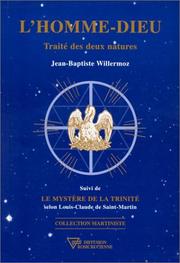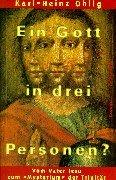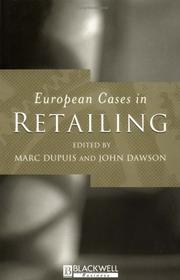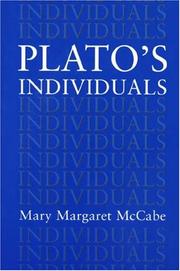| Listing 1 - 5 of 5 |
Sort by
|

ISBN: 2908534746 Year: 1999 Publisher: Le Tremblay (France) : Diffusion rosicrucienne,
Abstract | Keywords | Export | Availability | Bookmark
 Loading...
Loading...Choose an application
- Reference Manager
- EndNote
- RefWorks (Direct export to RefWorks)
Occultism --- Occultisme --- Religious aspects --- Christianity --- Aspect religieux --- Christianisme --- Jesus Christ --- Natures.

ISBN: 378672167X Year: 1999 Publisher: Mainz : Grünewald
Abstract | Keywords | Export | Availability | Bookmark
 Loading...
Loading...Choose an application
- Reference Manager
- EndNote
- RefWorks (Direct export to RefWorks)
God (Judaism) --- Monotheism --- Trinity --- Trinity --- History of doctrines --- History of doctrines --- History of doctrines --- History of doctrines --- Jesus Christ --- Natures --- History of doctrines.

ISBN: 0631207309 9780631207306 Year: 1999 Publisher: Oxford ; Malden, MA : Blackwell Publishers,
Abstract | Keywords | Export | Availability | Bookmark
 Loading...
Loading...Choose an application
- Reference Manager
- EndNote
- RefWorks (Direct export to RefWorks)
Retail trade --- Case studies --- Case studies. --- Retail trade - Europe - Case studies --- Benetton --- Body shop international --- Distribution --- Free record shop --- Haägen-dazs --- Ikea --- Intermarché --- Kookai --- Natures et découvertes company --- Promodes
Book
ISBN: 0691221626 Year: 1999 Publisher: Princeton, N.J. : Princeton University Press,
Abstract | Keywords | Export | Availability | Bookmark
 Loading...
Loading...Choose an application
- Reference Manager
- EndNote
- RefWorks (Direct export to RefWorks)
Francis Bacon (1561-1626), commonly regarded as one of the founders of the Scientific Revolution, exerted a powerful influence on the intellectual development of the modern world. He also led a remarkably varied and dramatic life as a philosopher, writer, lawyer, courtier, and statesman. Although there has been much recent scholarship on individual aspects of Bacon's career, Perez Zagorin's is the first work in many years to present a comprehensive account of the entire sweep of his thought and its enduring influence. Combining keen scholarly and psychological insights, Zagorin reveals Bacon as a man of genius, deep paradoxes, and pronounced flaws. The book begins by sketching Bacon's complex personality and troubled public career. Zagorin shows that, despite his idealistic philosophy and rare intellectual gifts, Bacon's political life was marked by continual careerism in his efforts to achieve advancement. He follows Bacon's rise at court and describes his removal from his office as England's highest judge for taking bribes. Zagorin then examines Bacon's philosophy and theory of science in connection with his project for the promotion of scientific progress, which he called "The Great Instauration." He shows how Bacon's critical empiricism and attempt to develop a new method of discovery made a seminal contribution to the growth of science. He demonstrates Bacon's historic importance as a prophetic thinker, who, at the edge of the modern era, predicted that science would be used to prolong life, cure diseases, invent new materials, and create new weapons of destruction. Finally, the book examines Bacon's writings on such subjects as morals, politics, language, rhetoric, law, and history. Zagorin shows that Bacon was one of the great legal theorists of his day, an influential philosopher of language, and a penetrating historian. Clearly and beautifully written, the book brings out the richness, scope, and greatness of Bacon's work and draws together the many, colorful threads of an extraordinarily brilliant and many-sided mind.
Philosophers --- Bacon, Francis. --- Bacon, Francis, --- Abbott, Edwin A. --- Bodin, Jean. --- Bruno, Giordano. --- Cambridge University. --- Charles I. --- Cicero. --- Coke, Sir Edward. --- Copernicus, Nicholas. --- Delia Porta, Giambattista. --- Democritus. --- Hermeticism. --- Newton, Sir Isaac. --- Parliament. --- Quintilian. --- Roman law. --- Telesio, Bernardino. --- Zwinger, Theodor. --- active life. --- alchemy. --- arcana imperii. --- astrology. --- atomism. --- dissimulation. --- empiricism. --- environmentalism. --- experiment. --- form. --- government. --- humanism. --- imagination. --- induction. --- kingdom of man. --- laws of nature. --- logic. --- materialism. --- metaphysics. --- political philosophy. --- progress. --- secrecy. --- simple natures. --- virtue. --- war.

ISBN: 0691029393 Year: 1999 Publisher: Princeton, N.J. Princeton Univ. Press
Abstract | Keywords | Export | Availability | Bookmark
 Loading...
Loading...Choose an application
- Reference Manager
- EndNote
- RefWorks (Direct export to RefWorks)
Contradicting the long-held belief that Aristotle was the first to discuss individuation systematically, Mary Margaret McCabe argues that Plato was concerned with what makes something a something and that he solved the problem in a radically different way than did Aristotle. McCabe explores the centrality of individuation to Plato's thinking, from the Parmenides to the Politicus, illuminating Plato's later metaphysics in an exciting new way. Tradition associates Plato with the contrast between the particulars of the sensible world and transcendent forms, and supposes that therein lies the center of Plato's metaphysical universe. McCabe rebuts this view, arguing that Plato's thinking about individuals--which informs all his thought--comes to focus on the tension between "generous" or complex individuals and "austere" or simple individuals. In dialogues such as the Theaetetus and the Timaeus Plato repeatedly poses the question of individuation but cannot provide an answer. Later, in the Sophist, the Philebus, and the Politicus, Plato devises what McCabe calls the "mesh of identity," an account of how individuals may be identified relative to each other. The mesh of identity, however, fails to explain satisfactorily how individuals are unified or made coherent. McCabe asserts that individuation may be absolute--and she questions philosophy's longtime reliance on Aristotle's solution.
1 <38> PLATO
---
Individuation (Philosophy)
---
Individuals (Philosophy)
---
Individuation
---
Particulars (Philosophy)
---
Philosophy
---
Haecceity (Philosophy)
---
Griekse filosofie--PLATO
---
Plato
---
-Aflāṭūn
---
Aplaton
---
Bolatu
---
Platon,
---
Platonas
---
Platone
---
Po-la-tʻu
---
Pʻŭllatʻo
---
Pʻŭllatʻon
---
Pʻuratʻon
---
Πλάτων
---
אפלטון
---
פלאטא
---
פלאטאן
---
פלאטו
---
أفلاطون
---
柏拉圖
---
플라톤
---
Contributions in concept of individuation
---
-Contributions in concept of individuation
---
1 <38> PLATO Griekse filosofie--PLATO
---
Aflāṭūn
---
Contributions in concept of individuation.
---
Platon
---
Platoon
---
Платон
---
プラトン
---
Plato.
---
Recollection.
---
accident.
---
affinity.
---
austere individuals.
---
being.
---
bundles.
---
change.
---
complex entities.
---
compresence of opposites.
---
cosmology.
---
dialectic.
---
dialogue form.
---
difference.
---
empiricism.
---
essence.
---
explanation.
---
generous individuals.
---
grammatical prejudice.
---
identity.
---
ignorance.
---
interpredication.
---
knowledge.
---
language.
---
lumps.
---
methods of philosophy.
---
natures.
---
one over many.
---
perception.
---
properties.
---
relations.
---
sameness.
---
separation.
---
soul.
---
stuff.
---
teleology.
---
transcendence.
---
understanding.
---
unity.
---
universals.
---
values.
---
variables.
---
wholes.
---
Individuation.
---
Metaphysik.
---
Individualität.
---
Plato,
---
Individuum
---
Prima Philosophia
---
Philosophie
---
Theoretische Philosophie
---
Erste Philosophie
---
Metaphysikkritik
---
Werden
---
Selbstwerdung
---
De-Individuation
---
Aristokles
---
Eflātun
---
Eflatun
---
Platonius
---
Platão
---
Platōnas
---
Pseudo-Plato
---
Platao
---
Po-la-t'u
---
P'urat'on
---
P'ullat'o
---
P'ullat'on
---
Ps.-Platon
---
Pġaton
---
Aflaṭôn
---
Aplaṭôn
---
Aflāṭūn
---
Platōn
---
Pseudo-Platon
---
プラトーン
---
Պղատոն
---
פלטו
---
Philosoph
---
Athen
---
Beurer, Johannes Jakob
---
Vietor, Theodor
---
Cornarius, Janus
---
Gessner, Conrad
---
Serres, Jean <
| Listing 1 - 5 of 5 |
Sort by
|

 Search
Search Feedback
Feedback About
About Help
Help News
News